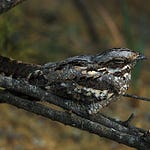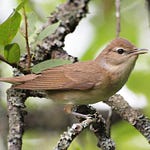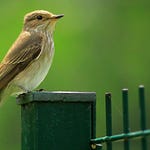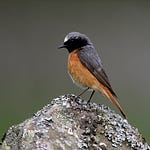For Dad.
What’s your favourite birdsong? Blackbird, perhaps? Nightingale? Wren? Skylark?
We wonder at the ability of birds to perform these complex, musical arrangements. I find it hard to resist inferring specific inclinations from their particular styles (and generally allow myself to do so on the basis that this can help put a name to the singer).
But house sparrows remind us that, whatever the musicality, the fancy mimicry, the invention, at its heart a song’s message appears to be:
I’m here. I’m alive.
We might be forgiven for missing a sparrow’s song as a song at all.
Chirping, chatting, chittering, arguing - these are the ways we tend to describe the lengthy conversations between sparrows.
For those of us with a colony of spadgers, spugs or squidgies in the neighbourhood, the noise can be a near-continual hubbub, as familiar and pervasive as road noise or human chatter.
And yet, hidden amongst it is, it seems, a song: a repeated, assertive chirrup.
Mainly deployed by males, it’s used to claim ownership of the nest site, and to create and cement the bond between pairs.
However, it’s so simple and similar to the typical contact notes that some wonder if it’s not so much a song as an ‘ecstatic call’ (a term more frequently used to describe the vocalisations of penguins.)
Whether they’re singing or ecstatically chirping, sparrows are well-known for finding homes in a very broad range of places where humans provide shelter and food.
As reported in Birds Britannica:
The most remarkable extremes involve sparrows found on the 80th floor of the Empire State Building in New York, and several records of them living down English coal mines. At Frinkley Colliery in south Yorkshire two or three birds survived for several years during the 1970s and bred 2000 feet (640m) beneath the surface of the earth, living largely on scraps provided by the miners.
The house sparrow remains the bird most often reported from UK gardens, though its numbers are way down on the great volumes of the past. In particular they have declined across big areas of the countryside, and disappeared from urban centres, perhaps from a combination of reduced feeding and nesting opportunities.
They do however have an enormous global range, with introduced populations thriving in North and South America, southern Africa, Australia and New Zealand, and long-established populations spread across their more natural range in Europe and Asia.
So perhaps this is the single sound of nature experienced by more of us across the world than any other.
For an absorbing account of the sparrow’s long entanglement with human culture in Britain, do look up the full entry in Birds Britannica, by Mark Cocker and Richard Mabey. This is one of the few ‘coffee table’ books I own that is always being opened, almost 20 years after it was first published. Second-hand copies aren’t too difficult to come by, just enlist a strong friend to help you carry it home.
As you may have noticed, posts dropped off earlier than planned this summer.
Normally they are weekly until the end of June, and then monthly until the New Year, reflecting the seasons’ rhythms. But it’s been seven weeks since the last Shriek, mainly because my father became very ill during the spring, and died in June.
Some of you reading this will have known my dad, Roger. He was the first person to sign up for my birdsong course in 2021, and the first to subscribe to this Substack. That epitomises the kind of father he was to me and to my brother Will. He took a keen interest in our endeavours, even those he struggled to understand (he had a great cocked eyebrow reserved for these occasions). He wanted to help us succeed in whatever ways he could.
We spent many hours birding together, especially in my teens. He particularly loved the reedy swamps of Stodmarsh in Kent but he was patient about my obsession with the shingle desert of Dungeness. Despite working long hours in the week he obliged weekend requests to be driven to birds that I had become a bit ‘twitchy’ about seeing (please please please, there’s a LITTLE EGRET at Rye Harbour, DAAAAD!*)
I found it quite remarkable that across four decades of going out to watch birds together Dad never appeared to pick up any skills in identifying birds whatsoever. It didn’t matter. He just enjoyed being in the countryside, walking a good route, discussing current affairs, books and philosophy, chatting to people and dogs and horses that we met, and having a pint and a pub lunch at some point along the way. He was good company, for me and for the many others who will miss him.
For all those times, and of course for so much more, thank you Dad.
*This was 1990. The availability of Little Egrets has improved somewhat since.
I live my life in widening circles
by Rainer Maria Rilke
Translated from the German by Anita Barrows and Joanna Macy
I live my life in widening circles
that reach out across the world.
I may not ever complete the last one,
but I give myself to it.
I circle around God, that primordial tower.
I have been circling for thousands of years,
and still I don't know:
am I a falcon,
a storm
or a great song?















Share this post